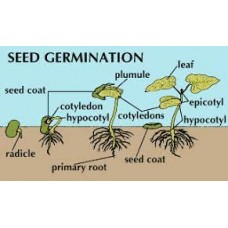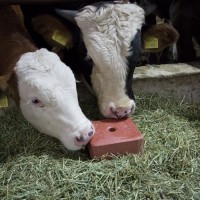What are the factors affecting seed germination
Germination is the process by which the embryo of a plant seed cracks its seed coat and grows under suitable conditions to form a new plant. In order for the seed to germinate, there must be sufficient water, oxygen and appropriate temperature in the environment where the seed is located. However, the most important factor is that the seed is ripe. How does seed germination happen?
To list the answers to these questions in items:
• Water entering the seed from the external environment enables germination to begin.
• With the entry of water, enzymes in the embryo become active and break down starch into glucose.
• ATP is produced by using glucose in O2 respiration. Using this ATP, embryo cells multiply by mitosis.
• The volume of the seed that absorbs water increases and the seed coat cracks.
• As a result of the differentiation of the new cells formed, embryonic
• roots and stems grow.
• Primary growth tissues develop in the embryo. The embryonic root emerges from the seed coat first.
This root grows in the soil in the direction of gravity and forms the root of the plant.
Plants in Terms of Germination;
Plants can be divided into two groups in terms of their germination characteristics:
The first group is those whose cotyledons come out of the soil; The second group is those whose cotyledons remain in the soil. Most of the dicotyledonous plants and some monocotyledonous plants such as onions are examples of the first group. Most monocots and some dicotyledonous plants such as peas and oaks are in the second group. In plants in the first group, such as beans (dicotyledonous plants), the embryonic body remaining inside the seed twists and grows in the opposite direction of gravity, pushing the cotyledons onto the soil. The stem and leaves develop above ground. In plants in the second group, such as corn (monocotyledonous plant), the embryonic stem develops directly above the soil. In these plants, the cotyledons remain underground.
NOTE: The entry of water into the seed activates enzymes in the embryo cells and initiates the synthesis of gibberellin hormone.
Gibberellin eliminates the effect of abscisic acid in the environment and enables the amylase enzyme to become active.
FACTORS AFFECTING GERMINATION
For seeds to germinate, water, temperature and oxygen must be at appropriate values. Apart from these, light also has an important effect on the germination of some plant seeds.
This topic is titled "What are the conditions and conditions required for seed germination?"
We will be able to find the answer to the question.
Water (Moisture)
During germination, the seed needs water for the enzymes to work. With the intake of water, the cells expand and begin to grow.
In cases where water is sufficient, the germination power and speed of the seed is high.
In arid soils where water is insufficient, seed germination may not occur due to excess soluble salts.
Improper irrigation and excessive fertilization may cause excessive salt accumulation in the environment.
In saline soils, germination occurs if the salt around the seed is removed by rain or irrigation after the seed is planted.
If there is too much water, germination stops because the seed cannot get enough oxygen from the soil.
Heat
It affects water absorption, enzyme activity and diffusion, and therefore germination. Even if other conditions are suitable, germination will not occur if the temperature is too low or high.
The temperature required for germination varies depending on plant species.For most plants, the optimum temperature for seed germination is approximately 25 – 30 °C. The minimum temperature is approximately 5 °C. Plant seeds adapted to hot regions require higher temperatures than temperate region seeds.
Oxygen
Plant seeds cannot germinate in an oxygen-free environment. As the metabolic rate increases during germination, the need for oxygen increases. Plant seeds undergo a dormancy period before germination. During this period, the metabolism in the seed has slowed down and even stopped. This process is called dormancy. In this process, the seed does not germinate even if all conditions are suitable. The duration of dormancy varies among plant species and even within species. Dormancy is caused by the abscisic acid hormone. Thanks to dormancy, seed germination occurs after unfavorable winter conditions have passed. Thus, the seeds germinate in the spring. NOTE: Some plant seeds can germinate in environments with no or very little oxygen.
For example, rice seeds can germinate but cannot develop in an oxygen-free environment. It still needs oxygen to develop.
| Genel | |
| Açıklama | Google aramada çıkmıyor sadece siraatsepetim yazarsan çıkıyor çıkınca meta açıklaması gözükmüyor. Meta ekledim kontrol edeceğim. |
What are the factors affecting seed germination
- Ürün Kodu: factors-affecting-germination-in-seeds
- Stok Durumu: Stokta yok
-
0,00TL
Benzer Ürünler
Why Are Salt Given to Cows and Sheep?
Why Do Animals Lick Salt?Cattle and sheep need to eat salt. There are licking salts for this. Health..
0,00TL
Daily Duties Of A Nurse
WHAT IS THE DAILY DUTY OF A NURSE ?The duty of the nurse is to apply the actual treatments (blood pr..
0,00TL
Game review What a Game to Rake
RAKE GAMESubject of the Game: In the game that takes place in the northeastern United States in the ..
0,00TL
What is Ahi Order? Very Brief Information
WHAT IS AHILIK, VERY BRIEF INFORMATION SUMMARYAhi order is the path followed by people who lived in ..
0,00TL
Seeing a Snake in a Dream
Dream interpretation of seeing a snakeSeeing a snake in a dream is interpreted as leaving one's riva..
0,00TL
Etiketler: seed germination process, Factors affecting seed germination, germination factors, factors, seed germination, seed coat, What are the factors affecting seed germination, seed germination diagram, definition, seed germination experiment





